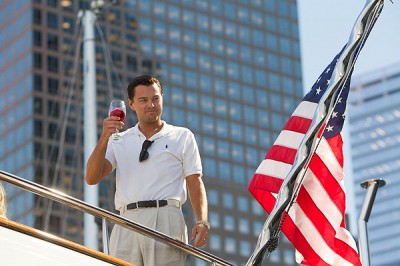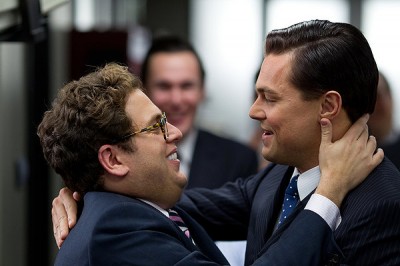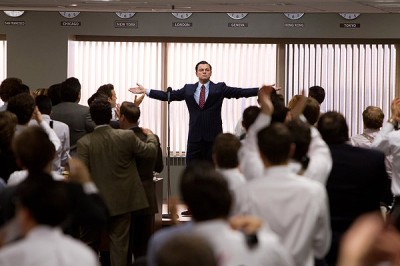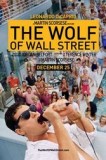| Reviews & Columns |
|
Reviews DVD TV on DVD Blu-ray 4K UHD International DVDs In Theaters Reviews by Studio Video Games Features Collector Series DVDs Easter Egg Database Interviews DVD Talk Radio Feature Articles Columns Anime Talk DVD Savant Horror DVDs The M.O.D. Squad Art House HD Talk Silent DVD
|
DVD Talk Forum |
|
|
| Resources |
|
DVD Price Search Customer Service #'s RCE Info Links |
|
Columns
|
|
|
Wolf of Wall Street, The

It's starting to seem that the real lesson of the American Dream is a worn-out playground truism: It's not how you win or lose, it's how you play the game. And how much you can get away with for how long.
At least this seems to be the zeitgeist of our cinematic times, post-Occupy and the ongoing financial malfeasance that keeps the majority of the citizenry around the world from ever rising above their station. It's not a 21st-Century message, though, so much as it is one we glean from casting an eye backwards. Movies this year, be they good (American Hustle) or bad (The Great Gatsby), dug up old stories to show us that it's always been this way, the writing has been on the wall and in the memo portion of the checks for decades. If you're rich, you can pretty much do what you want.
So it is with Jordan Belfort, the man who wrote the memoir upon which Martin Scorsese's latest, The Wolf of Wall Street, was based. Belfort pillaged the coffers from the late 1980s onward, until the law eventually caught up with him. He skirted the bulk of the jail time he deserved and came out the other side to tell his own tale, though he is relying on Scorsese to make his name legend. He's going to be infamous rather than famous, a crook with a fascinating story and an unglamorous fall. In Scorsese's hands, the stockbroker has become an American gangster. As it was with the gamblers and businessmen in Casino, so it goes with Wolf of Wall Street: the idea of these guys as folk heroes was somehow more agreeable when they were merely breaking legs with baseball bats and stealing cigarettes off the back of trucks. The money game is some depraved business.

Leonardo DiCaprio takes the wheel as Belfort, a New York kid looking to get rich in stocks. His first day on the job was on Black Monday in 1987, the worst dip in the market the U.S. had seen since the Great Depression. Left at the bottom with nowhere to go but up, Belfort builds an empire based on short-term grift using no-hoper cheap stocks. Eventually, he grows his business into a much more lucrative scam, luring the top earners into his schemes and manipulating the market via insider trading. Through it all, he and his knucklehead friends party like animals. At Belfort's side is his right-hand man, Donnie Azoff (Jonah Hill in his first serious role since Moneyball), who had sold furniture before teaming with "Wolfy." The men stoke the flames of each other's excessive appetites.
Also along for the ride are Belfort's trophy wife (Margot Robbie, TV's short-lived Pan Am), his rageaholic father (Ron Reiner, This is Spinal Tap), and eventually a determined FBI agent (Kyle Chandler, Friday Night Lights). Well, they are maybe less along for the ride and more in tow to Belfort's supersonic, drug-fueled ship. Life over these years is one big party, what Scorsese calls "Caligula on cocaine," an orgy of sex, drugs, money, and power. It's outrageous and often all kinds of funny while also being all kinds of wrong. Epic parties on the trading floor lead to all-night excursions to bars and strip clubs, and the more money that comes in, the more ostentatious the venue. Want to fly a helicopter back and forth from your palatial home to your massive yacht? Sure, why not.
Scorsese and screenwriter Terence Winter, a veteran of both Boardwalk Empire and The Sopranos, structure their tale as a rise, rise, rise, rise, and fall, top-loading The Wolf of Wall Street with the ever-increasing rush of escalating transactions and transgressions. Some of the situations are so crazy, they are almost hard to believe, but Scorsese is, like his subject, a salesman, and he sells the hell out of this story, aided in no small part by his star. DiCaprio is a beast in this movie, outdoing any previous performances by sheer kinesis and will. His charm is undeniable, right down to the oft-difficult first-person narration delivered straight to the camera. You want to buy what he is selling, and though he doesn't take our money and we know all along that he's a bad guy up to no good, it still feels like a betrayal when he goes too far. Marty lets us have our thrills, but the director also makes sure we pay for it by taking it in the gut when the comedown begins.
DiCaprio is well served by an excellent supporting cast. Hill is a phenomenal little creep. He makes Azoff hilarious and gross at the same time. Hill and DiCaprio have an amazing rapport during the most debauched scenes, including an extended centerpiece involving vintage Quaaludes that inspired the most perverse howling from myself and the rest of the audience I saw the film with. At the same time, Margot Robbie joins other great Scorsese "mob wives" like Lorraine Bracco and Sharon Stone, while Rob Reiner and Matthew McConaughey, playing Belfort's mentor, both make the most of their small appearances.

The artistry at work here is something else. The Wolf of Wall Street is agile and wicked and depraved. The tempo of the piece morphs based on the drugs the participants are taking. Energized and exaggerated when it's uppers, elastic and twisted and crawling at a snail's pace when downers. The music goes from the party rhythm of Joe Cuba and Eartha Kitt to the stuttering beat of Bo Diddley to some dark and mysterious stuff that was hard to identify, tunes straight out of the devil's jukebox. The length of Wolf matches the excess it portrays. At three-hours long, it's technically huge and bloated and at the same time, in the hands of Scorsese's longtime editor, the masterful Thelma Schoonmaker, it's so eminently watchable, you never really feel the time pass, at least not until the necessary tonal shift when Chandler's Agent Denham catches up with his man.
Though, if you want to really feel the burn of the imbalance of American justice when it comes to money, it's not going to come from what Belfort tells you or the penalties he buys his way out of. Rather, the true injustice becomes clear in the lawman's last scene, Agent Denham riding the subway, calling back to an earlier admission, lyrics from the Lemonheads' cover of Simon and Garfunkel's "Mrs. Robinson" perfectly timed to drive home just how unfair it all really is. The coda adds the insult to this injury. No matter how many Jordan Belforts raid the treasury, there is a legion of suckers just waiting to line up and sign their lives away, stuck under the same misconception that they will somehow absorb the secret of success. It's America's #1 commodity, false hope, and it goes perfectly with our #2 commodity, hubris.

Jamie S. Rich is a novelist and comic book writer. He is best known for his collaborations with Joelle Jones, including the hardboiled crime comic book You Have Killed Me, the challenging romance 12 Reasons Why I Love Her, and the 2007 prose novel Have You Seen the Horizon Lately?, for which Jones did the cover. All three were published by Oni Press. His most recent projects include the futuristic romance A Boy and a Girl with Natalie Nourigat; Archer Coe and the Thousand Natural Shocks, a loopy crime tale drawn by Dan Christensen; and the horror miniseries Madame Frankenstein, a collaboration with Megan Levens. Follow Rich's blog at Confessions123.com.
|
| Popular Reviews |
| Sponsored Links |
|
|
| Sponsored Links |
|
|
| Release List | Reviews | Shop | Newsletter | Forum | DVD Giveaways | Blu-Ray | Advertise |
|
Copyright 2024 DVDTalk.com All Rights Reserved. Legal Info, Privacy Policy, Terms of Use,
Manage Preferences,
Your Privacy Choices | |||||||










